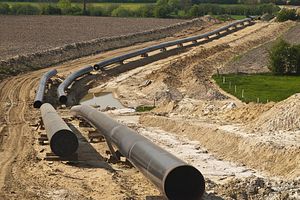Ever since the Eurasian recession began in earnest — or, predating that, when it was clear that Russia’s economic engine would stall under Vladimir Putin’s third term — there has nonetheless been a source of hope for Central Asia’s economies: China. On the backs of China’s One Belt, One Road (OBOR) platform, Beijing has stepped in to provide Central Asian economies with the necessary trade, transport, and internal investment to offset a reeling Russia and sinking hydrocarbon prices. For the past few years, China has stood as the region’s economic trump card — a rising Chinese tide would, as the regional governments assumed, raise their fortunes as well.
Despite China’s recent economic troubles, there was little outward sign that this prognostication would change anytime soon. The OBOR’s schematics proceeded as planned, and the recent rail transit from China to Iran further illustrated the potential integration Beijing can provide.
But even as Beijing denies any external ramifications from its current economic slowdown, a bit of news may call into question the notion that China can serve as an economic out for Central Asia. As Raffaello Pantucci, the director of International Security Studies at the Royal United Services Institute, wrote this week, “softening domestic gas needs have led to the suspension of the Line D gas line bringing hydrocarbons from Turkmenistan to China through Uzbekistan.” The suspension appears to stem, in part, from a decision out of Tashkent, with Interfax reporting that Uzbek officials said “technical reasons” necessitated the postponement.
The news would have been easy enough to brush aside, on both sides of the border. Not only does China currently have a trio of other pipelines with which it can transit Central Asian gas, but, as the Ministry of Commerce recently shared, the construction of Line D’s continuation through Tajikistan has already begun, and presumably continues. Indeed, Line D continues to represent China’s largest single investment in Tajikistan, as Carnegie’s Paul Stronski noted, and Beijing has given no indication that that will shift in the foreseeable future.
Still, the announcement of Line D’s postponement will likely shake some of the confidence within regional governments. Not that China won’t help offset Russia’s fiscal slump, per se, but that Beijing may not provide the economic deus ex machina it once presented. Furthermore, the pipeline — running about 1,000 km, and with the Uzbek section costing some $800 million — would have transited 30 billion cubic meters of Turkmen gas through Uzbekistan, Kyrgyzstan, and Tajikistan to waiting Chinese customers, offering a form of regional economic cooperation largely unknown. Bishkek and Dushanbe, likewise, were set to receive significant transit fees, with the former looking at approximately $1 billion in annual intake.
The pipeline would have also allowed Turkmenistan to bump its total exports to China to 65 bcm annually. While Ashgabat may have no desire to further tether itself to China — indeed, it’s shown every indication that it’s casting about for non-Chinese patrons — the government, rocked by bottomed-out energy prices, will take all the clientele it can at the moment. Any pause in Line D’s construction will only send further shudders through Ashgabat.
All things considered, the postponement of the Uzbek section may be but a blip on the radar. Construction could, theoretically, start up again relatively easily. But the image of China as the region’s economic savior has now dimmed, ever so much. As Pantucci added, “For China, it may be too early to predict over-reach, but certainly the slowdown at home is having ramifications abroad.” And those ramifications, to the Central Asian governments currently floundering in economic issues, couldn’t come at a worse time for the region.

































